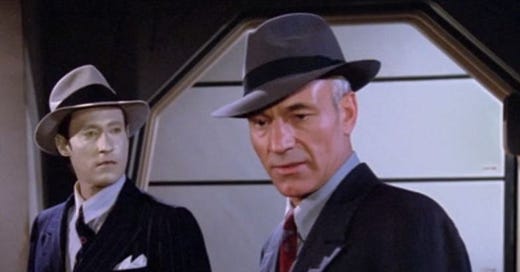Today’s post is the first ever co-authored piece for this Substack, written with @ArchibaldHeath1. Go give him a follow if you’re a Twitter person.
We would like to propose a new admonition for your consideration and use: “Get off the holodeck.”
In the Star Trek universe, the holodeck is an immersive virtual reality environment: visual, tactile, auditory, even olfactory. Choose or program a simulation, step through the door, and what you experience is almost indistinguishable from reality outside, unless the system is malfunctioning. (Malfunctions make for exciting stories, so the holodeck is often on the fritz.) In many episodes certain characters are warned not to indulge too deeply, and in at least one episode it is implied that excessive use of the holodeck can cause holodeck psychosis, a condition where the sufferer can no longer tell the simulation from reality.

In the United States today, we have our own versions of each of these: mainstream mass media is the holodeck, and many of our fellow citizens are suffering from holodeck psychosis. The gap between reality as people would experience it if they walked outside and interacted with their friends and neighbors and reality as described by, say, CNN, is huge. It is so great that it effectively creates two separate, alternate realities. And people who live continuously on the holodeck have no idea, any longer, how fake the simulation is.
Reality and simulation diverge in a thousand ways, but nowhere more starkly than over COVID-19. In the real world, COVID-19 is a respiratory disease, somewhat worse than ordinary influenza but not excessively so. At first it was novel, then epidemic, and is now endemic in the United States. It has a well-defined at-risk population that is not-most-people and is assuredly not-children. Comparative data makes it clear that most state interventions, particularly masks, school closures, and lockdowns, did approximately nothing to reduce the spread of COVID-19. Simultaneously, they caused large amounts of barely acknowledged secondary harm.
But on the holodeck COVID-19 is nigh unto the Black Death. State interventions have always been and will always be effective. Masks in particular have been a brilliant plank of public health policy and have almost perfect efficacy – in fact, if cases are rising anywhere ever, you can bet that’s just because people took off their masks.
Worse than them, though, are the horrible Trump supporters and other right-wingers who won’t get vaccinated. MAGA country is putting everyone in existential danger, especially centers of right wing activity like Hillsdale and Detroit… um, actually just don’t mention that second one.
You don’t have to take our word for any of this, we can quantify it. Almost from the beginning of COVID, surveys have repeatedly shown that holodeck psychosis has distorted perception through fear, causing people to massively overestimate both their personal risk of death and the effectiveness of countermeasures suggested by officials. For an example of the former, the University of Southern California's Dornsife Center tracked perceived risk from March 2020 to June 2021. The perception of risk of death was consistently at least 20 times greater than the measurable COVID infection fatality rate.


We could add other examples: the events of January 6th at the Capitol, last year's BLM riots, Russiagate. You will doubtless think of others. Any event, though, matters less than the phenomenon itself: the creation of a simulated reality by mass media, and the absorption of many of our fellow citizens into that reality, absorbed so thoroughly that they may never be able to get out.
In Fahrenheit 451, Guy Montag's wife Mildred lives in her own sort of holodeck in their home. Three walls of their living room are televisions (she presses Guy for the fourth), and she wears a pair of earbud radios that immerse her in nonstop sound. Her entire life revolves around her “family,” the characters in participatory soap operas she watches. These are more real to her than her husband: she and Guy have no relationship to speak of after ten years of marriage. When Guy asks her, she cannot even remember when and where they met. Guy's subversive interest in books is a threat to her reality, and she betrays him for it.
Both Mildred and Star Trek's holodeck abusers warned us of where we could go. Instead, we plunged on and built a holodeck for ourselves, one we can even take with us on tablets and smartphones. We burn books, that is, our culture, for its sake.
Get off the holodeck. Get your friends off the holodeck. Turn off that television and put that device away. Go interact with the real world for a change.



There’s a short story, maybe 80 pages long, called The Machine Stops, by E.M. Forster, who wrote it in 1909. It describes a world where machines do practically everything for people, who as a result become rather vegetative.
Very prescient. I just watched the latest three Star Trek movies. There was no use of the holodeck in those movies. Perhaps showing it would make people think too much. What I really took away from those movies upon rewatching them was the lack of depth to the characters and the story as a whole. I love action, and it was present in spades, but I sure didn't feel or think anything as a result of watching. The shallowness of our current media and entertainment may be having a greater effect on us than we realize.